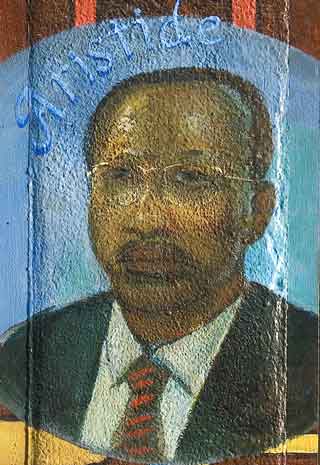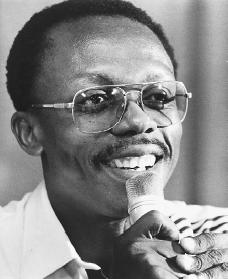 |
Photo: Scott Braley |
 |
Photo: Scott Braley |
Jean-Bertrand Aristide was born on July 15, 1953, in Port-Salut, a small town along Haiti's southern coast. In 1982, Aristide became a priest. In 1988, however, he was expelled from the Salesian Order for preaching too politically, for what Aristide called his "fidelity [faithfulness] to the poor." From the time he became a priest, Aristide condemned Haiti's lack of democracy. Aristide's opposition to the Duvalier dictatorship grew out of his religious beliefs and his committment to end the suffering of the Haitian people.
Aristide decided to run for President only a few months before the election in December 1990. His pledge for justice for victims of dictatorship violence struck a chord among the poor, nearly all of whom would be voting for the first time in the nation's first free election. He also spoke harshly against the United States, both as a supporter of the Duvaliers and as an exploiter of the world.
The United States might not have been able to prevent Aristide’s landslide victory, but there was plenty they could do to undermine him. The most effective method, adopted by the first Bush administration, was to fund both the opposition and the military. Declassified records now make it clear that the CIA and other US groups helped to create and fund a paramilitary group called FRAPH, which rose to prominence after a military coup that ousted Aristide in September 1991. Thousands of civilians were killed and hundreds of thousands fled overseas or across the border into the Dominican Republic. For the next three years Haiti was run by military-civilian juntas as ruthless as the Duvaliers.
In October 1994, under Clinton, the US military intervened and restored Aristide to power, with a little over a year of his term left. Although authorised by the UN, the restoration was basically a US operation. Then, seven weeks after Aristide’s return, Republicans took control of the Congress, and influential Republicans have worked ever since to block aid to Haiti.
It would be convenient for the traditional Haitian elites and their allies abroad if Aristide, who has been forced to preside over unimaginable penury, had been abandoned by his own people. But Gallup polls in 2002, the results of which were never disseminated, showed that, despite his faults, he is far and away Haiti’s most popular and trusted politician.

Photo Credit: www.notablebiographies.com
More: Paul Farmer on Haiti